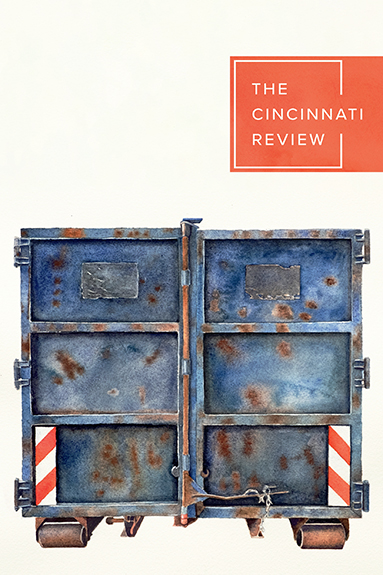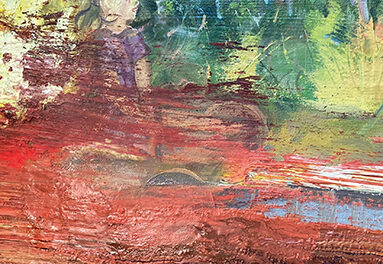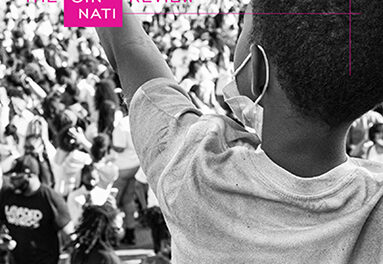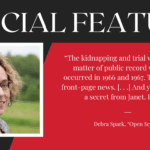I
It was three days after Christmas when I came home from work and found the gift bag leaning up against my door. “Love, Aunt Gloria,” read the card in her spidery cursive script, the kind that stymied children. I pulled a tin of cheap mint chocolates from the bag. Frango was stamped in bloodred ink across the lid, which depicted a curiously neutral Christmas scene. Santa sat in a grounded sleigh looking unperturbed, Rudolph stood patiently in his traces, and a child in ice skates idled at the center of a frozen pond.
I knew my Aunt Gloria well. She was equal parts fastidious and frugal, and she exhibited an almost passive-aggressive devotion to an extended family that mostly forgot she existed. I’d have bet money that she hadn’t bought that tin. It was one of those gifts designed to be passed on—reassuringly corporate, passably delicious, unopened, uninspected—a gift where you chucked the original card and replaced it with your own. I found myself imagining the chain: a harried woman who gave Frango to her mother-in-law, who gave it to her house cleaner, who gave it to her coworker, who gave it to her hairdresser, who gave it to one of her clients—a sexagenarian named Gloria who was willing to risk death to dye her hair. It was fun to imagine Frango’s provenance. It was like contact tracing without any of the stakes.
I, of course, had been put in a losing position. Christmas was past, and we weren’t gathering anytime soon to make up for the endless tide of cancellations. But I was a regifter with the best of them—or I believed I was—so I stuck Frango on the top shelf of my cupboard and vowed to forget it existed. I only had to wait a year, and the cycle would reset itself.
One day passed. Another. It was New Year’s Eve, and I was bingeing episodes of Naked CPA: NYC. The theme song filled my apartment: “Are your finances in disarray? She can help, but there’s a catch: She’s the naked CPA!” I checked my phone. It was 11:49 p.m. For a moment, instead of listening to the naked CPA explain the carried-interest loophole, I imagined a drawn-out New Year’s kiss. Tongues mingling. A glaze of spit around our mouths, my partner’s nose nuzzling the spot on my neck that made my whole body quiver. I shifted on the couch. I was lazy, lustful, lonely, hungry, my cupboards empty. Except—
When I brought Frango down from the top shelf, I grunted. It was such a heavy tin. Off came the lid. Off came the protective paper cushion. And lying there, instead of the forty-eight mint-chocolate squares I had been promised, was a pulsing turquoise blob.
I screamed. What new hell was this? What unkillable beast? What eager contagion? Was this what the virus had looked like when the mad scientists made it in the lab? Only conspiracy nuts believed that story, but as I stared down at the throbbing blue mass, it was hard not to feel that I had unleashed some fresh evil on the world. I grabbed my kitchen scissors and readied myself to stab Frango dead.
Frango had been roughly the shape of the tin, but as I raised the scissors it unspooled itself. A thousand filaments pricked out from the long bar of its belly, and it threw itself off the table. It chittered as it fell, then rippled across the floor and disappeared into the heating vent in the corner of my kitchen. I stood there panting. I could hear the naked CPA berating an astonished client in her thick New Yorkese: “What, you’ve never seen a lady’s tits before? Are you gonna stand there so long I need to file an extension?”
A barrage of fireworks drowned her out. I jumped. My phone dinged, then dinged again. On my laptop, the naked CPA’s blurred-out body was replaced by an animated champagne bottle, cork popping theatrically. White script unfurled across the screen: “Happy New Year, Maggie! May all your dreams come true!” I felt like Netflix was taunting me.
I had options, but none of them were good. I could go to the only neighbor I knew—a young sous-chef whom I used to hear having sex through the wall. For a moment I got distracted by a vision of him opening his door and kissing me in the way I had imagined. Then I remembered how I would look: unkempt, swaddled in cozy clothes, babbling about a turquoise blob.
That was the problem with anyone I might call—my mother, my landlord, 911. I might sound batshit crazy. I could interrogate my Aunt Gloria, but I already knew that she was innocent. She was a patsy, one regifter in a long and complicated chain. I could leave my apartment, but I couldn’t afford to stay in a hotel. And if I showed up at my mom’s house, she would surely let me in. That was the problem. She was old. I was young and worked at a coffee shop, where I breathed the same air as a hundred tainted strangers.
For a moment I wondered if I had hallucinated Frango. On TV they mentioned us sometimes—the ones who were completely alone, completely safe, completely losing our minds. But the tin remained unequivocally empty, an assertion of my sanity. And I trusted myself, in spite of everything. I was practical and self-sufficient, and before the virus I had treated my solitude like a benediction. I was equipped for this new form of loneliness, and I knew what I had seen.
So I improvised. I covered each of the five registers in my apartment with duct tape, wrapped myself in blankets for protection, held the scissors loosely in my hand, and vowed to stay awake with the naked CPA to keep me company.
Hours later, I woke up. My apartment was freezing. Something was poking me in the ribs—the scissors, I realized, which had slipped from my grasp. My bare feet were sticking out from the pile of blankets, and on top of my feet lay Frango, folded over on itself like a pile of intestines, its tubey blue body releasing a gentle and abiding warmth.
“Frango?” I croaked.
Frango rose up, and for the first time I noticed the delicate blue fringe on either side of its head, like the gills on an axolotl. A moment passed. Then Frango settled back across my feet and purred.
II
Frango was cautious at first. I’m sure he was scared that I would try to stab him again with the scissors or stuff him down the garbage disposal. He only came out at night, and in the morning I would find him covering my feet, or curled in the curve of my hip, or stretched along the length of my body. If I was awake but lazing in bed, he would stay, but as soon as I got up he would ripple away to some hidey-hole that I could never locate.
Then one night I decided to take a bath. I was lying there in the steaming water when all of a sudden Frango emerged from the exhaust fan in the ceiling. He seemed to leak out from the metal grille, a long, pendulous blue drop.
“It might be too hot for you, Frango,” I warned. I was surprised by myself. Up until that moment, I had never said anything to Frango, other than calling his name. But Frango seemed to like the water. As he slipped below the surface, he formed himself into a serpentine shape. I saw now that he had the same axolotl fringe on either end of his body. Perhaps he had two heads, or none at all. The gills framed nothing like a face—no mouth or eyes or nose. When he purred, the sound seemed to vibrate out from his entire body.
I was vulnerable, completely exposed. If any other being had walked in on me, I would have shrieked and tried to hide myself. My stomach was soft, my pubic hair thick, floating up to the surface of the water like a kinky forest of kelp. I had stubble on my legs and stretch marks on my belly, not from any noble act—I had never been pregnant, I had only gained weight. I knew I was supposed to love myself, but I loved myself better with clothes.
I watched Frango elongate under the water, fat snake to slender snake, and then he stretched himself into an unbroken band around my body so that he passed behind my neck and around my feet, like he was holding me together. His gills rested on either side of my neck. I tickled them and Frango purred. I felt a moment of release, like when my ears popped on an airplane, except it was my whole body popping and airplanes now seemed like the vestige of another life.
I opened my mouth to ask Frango what had happened, but nothing came out.
“Maggie,” said my own voice, muffled by the water. “Who am I?”
Frango could assume any shape, though he could not change his fundamental mass. At his flattest, he was roughly the size of a bath mat, though he hated to spread himself so thin. His favorite shape was that of a snake, and his favorite way of moving through the world—the world of my apartment—was to drape himself around my neck like a stole.
Frango had a repertoire of sounds. Every time I switched on my electric toothbrush, he would hiss. He would chitter when he was sad or frightened but also when he was deep in thought. And the chirping was something he taught himself—a sound he adopted after watching the birds that frequented the feeder in front of my apartment.
But the most important fact about Frango—the quality that changed both our lives—was that he could speak only by stealing someone else’s voice.
That first time it happened, I threw myself out of the tub. Water sloshed everywhere. I stood naked in front of the mirror, trying to scream. I opened my mouth, touched my throat, squeezed my tongue between my teeth. Nothing felt different or wrong. I simply had no voice.
Frango hung behind me on the shower rod like a soggy pair of stockings. I turned, snatched him up, and tried to wring his neck.
“I’m sorry,” said my own voice, plaintive. “I didn’t know I could do that, Maggie. Please believe me.”
It was pointless, trying to strangle a boneless and remorseful thing. I slung him over my shoulder and hurried into my bedroom. Grabbed a pen from my desk and scribbled on a scrap of paper: “How long will it last??????”
But Frango could not read.
I didn’t know what to do. I drafted a long, crazy-sounding email but then had nowhere to send it. I made myself ginger tea with honey, gargled Tabasco, typed endless variations of the same question into Google search: “Blue blob steals voice how do I get it back?”
Nothing.
By the end of the night, I’d given up. I sat slumped in front of my laptop watching Naked CPA: NYC. On my phone, I tapped out a text to my supervisor explaining that I had laryngitis. Frango was puddled in my lap. He hadn’t spoken since he apologized in the bathroom. He seemed to understand that it upset me when he used my voice, but now he could not help himself.
“Maggie, how tall can buildings be?”
“What is the difference between night and day?”
“Do cars have feelings?”
“How do cities get their names?”
“Where do I come from?”
“Why is that woman yelling?”
“Why is that woman not wearing any clothes?”
When my voice returned roughly twenty hours later, it felt like a gush of water pouring down my throat. One moment Frango was asking me a question that I could not answer. The next moment I stood up. I screamed, I squawked, I croaked, I sang. I made every sound that I could think of. And all the while Frango hung from the ceiling fan, swinging slowly back and forth.
This is the second fact that changed our lives: when Frango took a voice, he was powerless to give it back, but he was also powerless to keep it.
“Frango, are you okay?” I asked, after I had calmed down.
Frango chittered.
“Flare your gills for yes, flatten them for no.”
He flared his gills. But still he swung, a sullen pendulum.
Later, when I let Frango take my voice one day a week, I would carry around a notepad and write down all his questions. That first time, though, I answered everything from memory. I explained how the Earth was a ball that orbited the sun. I looked up the tallest building and read to him from the Wikipedia page for the Burj Khalifa. And I laid out the concept of Naked CPA: NYC—how Gina Brambilla, a covert nudist, left her twenty-year tenure at H&R Block to start her own accounting business.
I paced around my apartment as I answered. Slowly, Frango extended himself. He reached for me like an elephant questing for food. I paused for a moment and let him settle on my shoulders. Then I continued explaining the world.
III
For several days after I regained my voice, Frango was terribly glum. When the birds came to kibitz at the feeder, he slammed himself against the window to scare them away. He hissed and chittered, but he did not purr, and when I turned on Naked CPA: NYC—a show we always watched together—he rippled off my lap and hid. I found him in my closet, moping in his bath-mat shape.
“Look, we’ll make a deal,” I said. “You can have my voice on Mondays when I don’t have work.”
Wednesday through Sunday I worked at Kaffeine, early-morning shifts manning the register and making people’s absurdly fussy drinks. On Monday morning I kicked off my socks in bed, and Frango formed a band around my body, pressing himself against the arch of my feet, the crook of my neck. I closed my eyes and waited for the pop. Then Frango was butting at my hand, brimming with questions. On Tuesday I answered him. On Wednesday I went back to work.
There wasn’t much to do that winter, other than work and come home. We kept our schedule up for several months. At first I considered Monday a sacrifice, but it soon became the day I yearned for most. I wanted to know what Frango liked, what he thought, if he’d existed before I opened the tin. Monday was the day that he could answer.
“Frango, do you ever feel hungry?”
“Why do you like taking certain shapes and hate others?”
“Can you understand the birds?”
“Do you have to think about changing your shape or does it just happen?”
“Where did you come from?”
“What does it feel like when I touch you?”
“Are you glad that I’m the one who found you?”
One Monday in April, very early in the morning, I felt Frango leave his spot beside me in bed. He was back when I woke up, curled in the crook of my neck, emitting that gentle warmth I loved so much.
“Where did you go?” I asked as I kicked off my socks and uncurled myself.
“Just exploring,” answered Frango in a voice that wasn’t mine.
I sat bolt upright in bed. It was a voice I recognized—the sous-chef’s voice. Frango twined around my arm like a blue bangle, climbing to my shoulder and pressing himself close to my ear. His body was smooth and warm and it felt like a gloss against my skin, as if his touch might polish me.
“I wanted to talk with you,” he said. “For real, I mean. Like when Gina talks to her husband and tells him all about her day.”
The sous-chef, a veteran smoker, had an unusually deep voice. I’d often spied him outside, slender, dressed in black, puffing on a cigarette. Now his voice seemed to settle over me like a woolen blanket. I shrugged it off.
“How did you—”
“Air ducts. He was asleep and I just shaped myself around him.”
“He’ll be totally freaked out when he wakes up. It’s not like me, where I understand what’s happening.”
Frango gave his approximation of a shrug—a whole-body quiver, like he was doing the wave.
“It’s temporary,” he said.
It’s hard to explain how I felt. Queasy. Joyous. Jealous. Guilty. Frango was right. The sous-chef would spend the next twenty hours massaging his throat, but he’d wake up on Tuesday unscathed. It was my relationship to Frango that had changed.
“Frango, did you talk to him?”
“I don’t care about that limbecile,” Frango answered in his beautiful, scratchy, exasperated voice. Limbecile—it was the word he used for any human he found annoying. Up until that morning, his use of the term had been limited to a couple of the naked CPA’s most trying clients. But now the outside beckoned: so varied, incredible, and new. “Listen to me, Maggie—I’m trying to talk to you.”
At first Frango stayed in my apartment building, and a mysterious bout of voicelessness passed up and down these halls. Enough tenants complained that there was a big fuss about mold spores and improper ventilation. The rental management company sent an inspector into each of the units—a man clad in an N95 and a face shield—who was tasked with proving that we didn’t need remediation. It scared me to have another human in that tiny space. Frango hid in his most secret hidey-hole until I called him out.
After that, we expanded. I would drive him late at night to nearby apartment blocks—the new glass-and steel-ones on Division full of hundreds of Midwestern hipsters who’d moved here for the vibrant city life, or the low-income complex on Powell where the dumpsters were always overflowing. I would crack my window and recline my seat and some time later he would nudge me awake.
Once, early on, he greeted me with a child’s piping voice, and I yelped and pushed him away. I had to explain that it felt wrong to talk so deeply to a child. Other than that, I tried not to mind too much about the voices he chose, or to impose any rules that would put him in danger. Pick the safe ones, I insisted—the single ones, the deep and lonely sleepers. I was careful never to admit that I loved the young men most. I wanted Frango not to be it or she or they but he, and when Frango took a young man’s voice, I felt that he was perfectly himself—or, rather, that he was perfectly the self I wanted.
The Portland Tribune ran a single story that spring about an unexplained outbreak of laryngitis in the inner Southeast, and that was that. No one cared. We had other things to worry about.
IV
“If you could see the inside of anything, what would it be?” asked Frango in the voice of an old woman with a Spanish accent.
“The Sistine Chapel, except without any of the people.”
“I’d like to see the inside of a whale.”
“It’d be dark.”
“I’d bring a flashlight.”
“Won’t do much good if you can’t hold it.”
“I’d bring you.”
“I don’t want to see the inside of a whale.”
“If we put the whale inside the Sistine Chapel, it would be a compromise.”
“I want to see the frescoes, Frango.”
“You could look up through the blowhole.”
I giggled. I imagined that a blowhole, in Frango’s vision of the world, was really just a glorified sunroof, like the one in Gina Brambilla’s Escalade. I imagined the two of us at the center of a vast and squelchy dome, craning our necks to glimpse the image of God endowing Adam with the gift of life. I imagined Frango singing to me with a whale’s voice.
“Are they beautiful?” asked Frango.
“People say they’re our greatest works of art.”
“The whales, I mean.”
In an old man’s voice, a nebbishy, nasal, tender voice:
“Maggie, I just had an epiphany. We both came out of a box.”
“Hmmmm?” I was lying on the couch in that susceptible, half-asleep state when anything seems possible.
“I came out of a chocolate box. You came out of your mom’s box.”
“Oh Jesus, Frango. Go to sleep.”
I started bringing Frango outside with me that summer. He would form himself into a purselike shape and hang from my shoulder—a slender strap and a small, boxy body with a few folds and ridges to give the impression of a flap. I brought him to work, the bank, the grocery store. It was in his purse shape that Frango met my mother.
She had invited me over for lunch and we were sitting at a card table set up on her front lawn. My mom had retired from teaching two years before and then been as stunned as the rest of us—freed from the tyranny of work only to be trapped at home with her cat and dog. It would have made sense for us to combine our solitude and live together, except I might have killed her. She was a small, stooped woman—somehow both pale and vivacious—and Ruthie, her dog, a border collie of unusual discernment, sat beside her feet in the thick green grass that my mother proudly watered.
I noticed that my mother spoke to Ruthie in a new way—matter-of-factly, without a single singsong note. It was as if Ruthie were just another Frango, capable of understanding but not yet capable of answering. Ruthie, who had sniffed my Frango purse with unusual fervor when I first arrived.
“Are you happy, little one?” my mother asked, gazing down, and for a moment I thought she was talking to me. But the questions for me were much harder.
“How’s work? How’s life? Have you called Gloria lately? I know she’d like to talk to you. Are you keeping in touch with your friends? Are you doing okay in that tiny apartment? Have you thought about moving? Have you thought about what you might do next?”
I loved my mother, and she wore me out. She treated my life like a symptom of the virus, not like a thing I might actually want. I would have left angry, except for one moment right at the end of lunch. I was getting ready to leave when she noticed Frango hanging from my shoulder. “Such a pretty purse,” she murmured, with a mother’s intuition, “such a rich and living blue.” And I had laughed and toasted her with my can of warm LaCroix, and her dog had lain calmly at her feet, dumb and oblivious or silent and wise, it was impossible to tell.
“How much is a million, Maggie?”
“You can imagine, Frango.”
“I can’t.”
“Picture a million grains of sand, and each grain of sand is a person.”
“You’re basically describing a cup of sand.”
“Okay, picture something else. Paper clips or something.”
“A million is a lot?”
“Yeah.”
“But there are still so many people left.”
“Why are you asking me, Frango?”
“There’s only one of me.”
I ruffled his gills. “One of a kind.”
“So, which is sadder? If I die and there are no more Frangos or if a million people die and there are billions left?”
“It’s not a competition.”
“But which would make you sadder?”
On a Wednesday in August I called in sick from work and drove to the beach. It was one of those perfect summer days when the sun seemed like it would stay forever. The tide was low, the beach long, and all of it—except where I was lying—bristled with a gathering of gulls. There was not a human soul in sight. The sand was covered in white slicks of bird shit, and the gulls screeched and flapped their wings. Frango, on his filament feet, wound his way among them, chirping.
Twenty minutes later he returned, chilly from swimming in the water. I shrieked when he pressed himself against me.
I had brought him to a beach I loved, a six-mile spit that stretched into the ocean. A hundred years ago they had built a resort town at the far end of the spit and declared it the Atlantic City of the West. In fifty years it had been ruined by the encroaching water. In another fifty it had vanished. Then the spit stopped shrinking. It resisted the ocean with an infinitude of sand, as if it had only eroded to throw the humans off its back. I loved the mythic power of the place. It was easy to imagine walking back into the dunes and finding a Wedgwood vase wreathed in beach grass, or a crystal doorknob that had been handled by a hundred queenly women.
“What’s your favorite memory, Maggie?” Frango had taken a young woman’s voice, lilting and strong.
“This is my favorite memory, Frango.”
I raised up my arm to shield my face from the sun.
“Let me do that,” he said, and he shifted into a handkerchief shape. Gently, Frango crawled across my face, brushing my lips as he took his position.
It should have been a perfect moment. But I had noticed something that unsettled me, something that had been nagging at the edge of my consciousness for the past few weeks.
No longer could Frango change his shape in the blink of an eye. Frango had started shifting slowly.
V
Then everything happened in reverse.
For a while, Frango was still limber enough to slither out of my car window and sneak into apartment buildings. The last new voice he ever took was from a Black woman living in the Princehill Flats. But when he returned, he had reverted to his bath-mat shape, thin and exhausted, dragging his body across the rough concrete. “Maggie,” he cried, “Maggie, something’s wrong,” and I opened my door and scooped him up into my arms.
Sometimes I wondered if taking voices wore him out, yet it seemed integral to him, to his aliveness. I thought of Frango speaking in the same way that I thought about my heart. Each time my heart pumped my body full of blood, it wore itself out one iota more, but it couldn’t be stopped—it represented life in its most fundamental form, even as it inched toward death.
We took the sous-chef’s voice three more times after the Princehill fiasco, studiously not discussing whether we were doing harm. The sous-chef would get the day off work, I told myself; he would know that it was temporary and not be scared. It was, in truth, my favorite voice, not just for its smoky richness but because it summoned the image of a man I found attractive. I could never tell Frango why I liked it so much, although he must have known.
“What does it feel like?” I asked him on the last night when we could both still talk. He assured me that it wasn’t bad, that it probably felt the same as when children’s bones grew harder—except quicker, so much quicker. He didn’t want to talk about it, he said. He wanted to talk about everything else: why motorcycles made so much more noise than cars, if years were long or short, what I remembered from being a baby.
“Not much,” I answered. “Were you a baby in the tin? Do you remember?”
Frango flattened his gills.
“Just darkness,” he said. “The first thing I remember is this huge round thing looking down at me. It was grotesque. These two wet orbs and this pointy knob in the middle and this hole with a pink edge that was making a horrible noise.”
I pinched him. Frango purred.
But I couldn’t shake the image of Frango returning to the darkness, not a living blob but a blot of nothing. It made me want to break every dish in the coffee shop, to open my door and scream down the hall. It made me want to scrape the frescoes off the ceiling of the Sistine Chapel and weep until I was completely drained, until I too teetered on the edge of the abyss.
The next day I showed up at work drawn and exhausted, clutching Frango close.
“Something’s wrong with your purse,” said my coworker Raquel.
He was holding his purse shape, but barely. The part of him that was supposed to be the body of the purse looked like it had melted in a fire. He drooped toward the floor, ugly and distended. I scooped him up and hid him in my cubby.
He accompanied me outside a few more times after that, but soon the purse shape was impossible. Even the stole grew harder for Frango to hold. More and more he flopped back into his first form—the vaguely rectangular shape in which I’d found him—falling from around my shoulders and smacking the floor.
I drew a bath.
Frango had already shifted into his snake shape, though one end was bumpy and misshapen, like the snake had swallowed a rat. I settled into the bath and pulled him in. Water seemed to loosen him, to make it easier to change. I drew him around my feet and behind my neck, closing the loop, massaging that troublesome spot on his body.
And then I felt it, for the final time, that full-body pop. And I heard it, for the final time, my own voice rising from the scalding water.
“We should go on a road trip,” he said. “Our last hurrah. You be Thelma. I’ll be Frango. We could drive to New York and find the naked CPA. I could take her voice. Would you like that, Maggie?”
I nodded. I stroked his head. But it was sad for both of us, this one-sided way of talking, this return to the time before we’d reached our understanding. So mostly we just lay there, my skin rosy from the heat. Frango was blue, but his blueness was fading. It was no longer the rich and living color that had caught my mother’s eye.
“Maggie,” he said at last, “why do we love the naked CPA?”
I wanted to tell him that there was something about her that was absolutely alive, that burned out from her. She was in her forties, not beautiful but so brazen that it did not matter. She wasn’t afraid to be naked in front of anyone, not like me. You could feel it, you could feel that she owned the world, savored it, would never go back to her corporate cubicle and her polyester suit.
I wanted to repeat to him the monologue from my favorite episode—an episode in which Gina closed up her office on a Friday in July and took the ferry to Gunnison Beach, the famous nude beach on Sandy Hook.
“I love this,” she said. She was standing right where the water met the sand, munching on a bagel. “I love this hot fucking sun. I love this onion bagel. I love my husband.” He waved from where he sat on a beach towel, fully clothed, his nose covered in zinc oxide. “I love being naked. I love the sand, even though I’m gonna find it in my ass crack for the next six weeks. I even love Jersey, if you can believe it.”
She pulled off her comically large sunglasses—the only item on her body—and looked straight into the camera.
“You know, Benjamin Franklin, he was a real piece of work. Don’t be fooled, not even by a fucking founding father. You can count on more than just death and taxes. It’s a good fucking life.”
For a few more weeks, Frango retained the ability to chirp, hiss, and purr. Then he fell silent. Then he lost the ability to gesture with his gills. For a while he could still crawl around in his rectangle shape. Then he lost that too. He lost everything. He just lay there, wherever I set him down, faintly warm to the touch. It was warmth that was the final sign of Frango.
It was a terrible time. I was a zombie at work, messing up orders and overheating milk. I stopped answering my phone and washing my hair. I would eat a whole bag of potato chips and let the crumbs catch on my boobs. It was a new form of loneliness, one I hadn’t known about. My mother believed I was suffering from the virus—not the illness itself, but the malaise of being trapped alone in a tiny apartment for two and a half years.
“It’s better now, Maggie,” she assured me. “It’s time to go out into the world.”
But I didn’t want to go out into the world. I wanted to stay in my apartment and rewatch all eighty-two episodes of Naked CPA: NYC while holding Frango in my lap. I swear he glowed a little warmer when the theme song played, but I couldn’t be sure.
That December I brought down Frango’s tin from where I’d stashed it in my closet. It was exactly as I’d remembered—the idle Santa, the ersatz passiveness, the way the illustrations on the tin insisted “Nothing to see here, folks” when in fact it had contained such strange and rampant life.
Was this the third and final fact, that Frango had a lifespan of a single year?
I didn’t believe it. It was, as Frango would have said, a limbecilic proposition.
The first time we ever watched Naked CPA: NYC together—during Frango’s first barrage of questions—Frango asked, “Is this the end?” He didn’t yet understand the concept of a series. A moment later, the credits were relegated to that tiny inset box, and the autoplay popped up with the spinning wheel: “Next episode in ten, nine, eight . . .”
Of all the questions that he asked that night, that one made me laugh the hardest—silently, of course, heaving my shoulders as I threw back my head. I knew that even if we watched every episode of Naked CPA: NYC, Netflix would just shunt us to another series. There was Naked and Afraid or Dating Naked or Skin Wars or Stark Trek or Naked Chef, and when one niche ran out, the algorithm found another: Undercover Boss or Girl Boss Squad or YOLO CEO or Liar Liar Boss on Fire.
If you watched enough Netflix, you learned it was impossible to end.
Of course I wanted to hold Frango in my lap, to cuddle him until he grew a little warmer every day. And yet I couldn’t believe that he would live again and become himself. I believed, instead, that Frango had been made by the Gods of Regifting, destined to be born and born again and shaped by the people who found him. It was true that he would never be the Frango I had known, because that Frango had been the perfect product of him-ness and me-ness, an admixture that could never again exist in the world. I imagined Frango talking with someone else about something different—linguistics or K-pop or pickleball—and hanging from their shoulders like a shawl.
And so I kissed that faded blue rectangle that held the seed of Frango and set it in the tin. I closed the lid and put back the protective paper cushion and stuck it in a bag.
The next day I gave it to my coworker Raquel. I knew that she would pass it on.
Zoe Ballering’s short speculative fiction has appeared in Electric Literature’s Recommended Reading, Hobart, and Craft. Her debut collection of stories, There Is Only Us (University of North Texas Press, 2022), won the Katherine Anne Porter Prize in Short Fiction. She lives in Portland, Oregon.
For more great fiction in Issue 22.1, order now in our online store. Digital copies are only $5.










